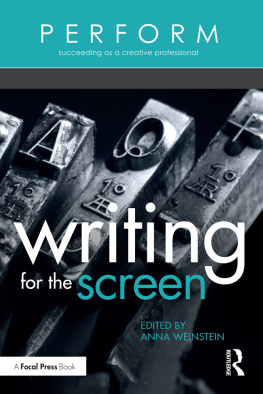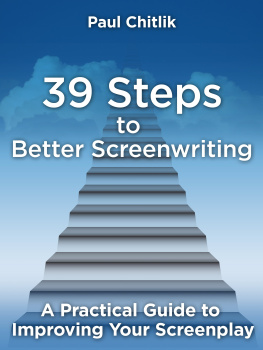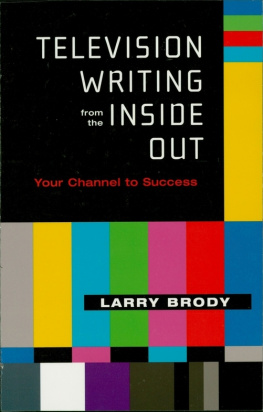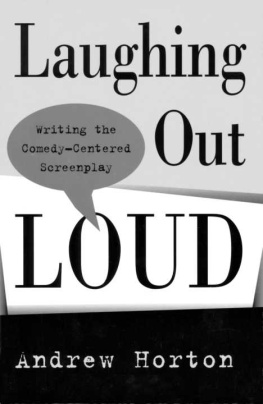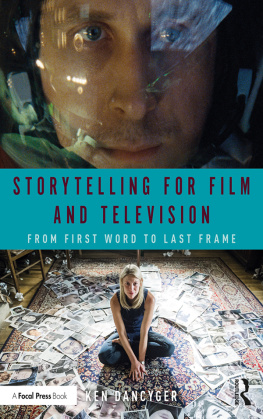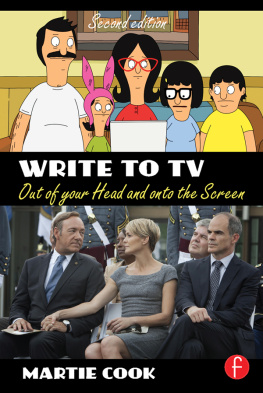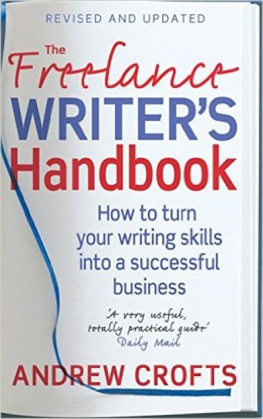
EXTREME SCREENWRITING: TV WRITING
Copyright 2018 Barb Doyon
All rights reserved. No part of this book may be reproduced in any form or by any electronic or mechanical means including storage and retrieval systems without the permission, in writing, from Barb Doyon.
Printed in the United States of America.
For permission requests, write to the author at:
Extreme Screenwriting
Barb Doyon
310 N. Indian Hill Blvd. 401
Claremont, CA 91711
Cover design created by author using stock photography images licensed from Pond 5.com.
Interior Design by Soumi Goswami
INTRODUCTION
Extreme Screenwritings TV Writing book was written in an informal, yet direct way to assist the aspiring television writer in creating a commercially viable product thatll help nail down a sale. The material requires the writer to have a rudimentary understanding of film/screenplay writing, as the book makes comparisons between the two mediums. If the writer lacks the basics in screenplay writing, then start with Volume 1, Extreme Screenwriting: Screenplay Writing Simplified available on Amazon.
The author, Barb Doyon, is the owner/founder of Extreme Screenwriting, a Los Angeles, California, USA, screenplay and teleplay coverage and ghostwriting service, catering to A-list screenwriters, aspiring screenwriters, A-list TV writers, aspiring TV writers, producers, production companies, agents/managers, directors and actors. The services goal is to go beyond writing a great TV script to writing one that has strong commercial potential and can compete in the fiercely competitive television marketplace.
The material teaches the writer how to understand the difference between film and TV writing. While learning how to create a pilot that will generate interest in the spec marketplace and result in a possible sale.
Best Always and Keep Writing,
Barb Doyon
Owner/Founder
Extreme Screenwriting
www.extremescreenwriting.com
Barb Doyons books available on Amazon:
Extreme Screenwriting: Screenplay Writing Simplified (Vol. 1)
Turn Your Idea Into a Hit Reality-TV Show
10 Ways to Get a Hollywood Agent to Call You!
Potpie Diet
TABLE OF CONTENTS
CHAPTER ONE

Most aspiring writers in the film/TV market prefer to write a screenplay. A screenplay is a story written for theatrical viewing on the wide screen. After all, you grew up with movies and the ultimate dream is to see your name up on the silver screen. Its the symbol of success to have a feature film produced.
With this said, many overlook the fact that the industry is inundated with spec screenplays. Those are scripts written on speculation in hopes of a future, feature film sale. The Writers Guild of America receives 60,000+ registrations for spec, feature-length screenplays per year and most have been floating around the marketplace for 5 years or more, which means 300,000 up to 1,000,000 spec screenplays are on the market at any given time. In an industry that only makes a few hundred-feature films per year, the overwhelming spec screenplay competition considerably lowers the chances of making a feature film sale.
However, there is a market that screenplay writers often overlook and thats television. Unlike feature films with a limited number of movies made per year, televisions base is widening, with over 500+ cable channels and on-line streaming, that runs 24 hours a day, 7 days a week. This creates an ever-growing need for content from half-hour shows, one-hour shows and feature-length movies, as well as, docu-series, mini series, movies of the week (MOW), and even the little-known reality-TV writing market. The content ranges from childrens shows through adult material, and fresh material is always in demand for existing shows and original pilots. Plus, some reality-TV isnt as real as it appears and often relies on writers for content. Finally, per year, TV produces ten times the amount of material as the feature film market, which significantly increases the potential for a writing sale.
Become a TV Writer
First, the easiest way to become a TV writer is to master the craft of feature film screenwriting. The main reason is because TV storytelling mimics screenwriting fundamentals and it will make for a smoother transition. However, the writer needs to be aware of the differences between TV and Film writing to determine if such a transition is a wise career move. Frankly, TV writing isnt for all screenwriters and vice versa.
For example, while the two mediums share the same core stories, how theyre handled is vastly different. Feature films are driven by visuals, with a 60% visual to 40% dialogue ratio, while TV is a talking-heads medium, with a 70% dialogue to 30% visual ratio.
Switching between feature film writing and TV writing requires knowledge of how the two mediums differ
First, lets determine if youre a writer who can transcend the two mediums.
Are You a TV Writer?
TV is referred to as the talking heads medium because the storys delivery depends on dialogue, while film is the opposite because the visuals deliver the story.
For example, in a well-written feature film screenplay, a producer should be able to remove all the dialogue and still know what the entire story is about. While in a well-written TV pilot, all the visuals can be removed and the showrunner should still know what the entire story is about.
For example, in TV detective shows, the detective often sums up the case at the end of the show and tells us how the crime was committed and who the real perpetrator was, but in film this would never happen. In film, the perpetrators revealed visually and nobody has to tell us because weve seen it unfold before our eyes.
For the screenwriter considering a transition into TV writing, the question becomes obvious. Is the writers style based more on visuals or dialogue? Does the writer have an ear for dialogue? Can the writer put aside the big, visual landscapes often seen in films and hone it down to a moment with characters talking?
If the writer can do this, then the writer may be ready to transition to TV. If not, then remain a screenwriter. If the writers 50/50, then the writer is a good candidate for a career in both mediums.
Another way to tell if the writer will be able to switch between the mediums is to look at the writers finished screenplays. If the screenplays are dialogue heavy, maybe the writer is really a TV writer because screenplays should be mostly visuals. If the writers screenplays are dialogue heavy and/or properly balanced, then give TV writing a try.
Psych Test
There are three types of writers: the visual writer, the hearing writer and the feeling writer. What type of writer are you?
Visual Writer
Visual writers are often the best screenwriters because they tend to speak quickly, can finish others sentences and see things before they hear them. These types of writers say things like, I see what you mean, or I see what youre talking about. Their mind seems geared toward the visual oriented delivery of stories and they see the world in moving pictures.
Hearing Writer
Hearing writers are often the best TV writers because they tend to speak slower, drag out sentence delivery and hear things before they see them. These types of writers say things like, I hear what youre saying, or I know what youre talking about. Their mind is geared toward the audio delivery of stories and they have an ear for dialogue.
Feeling Writer
Next page

